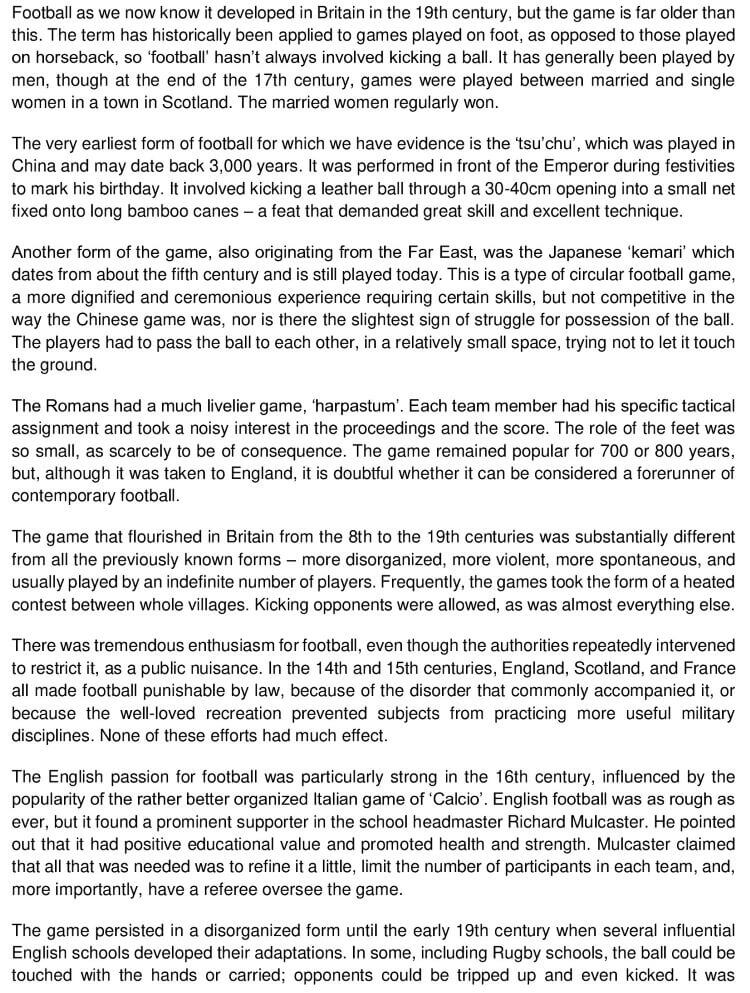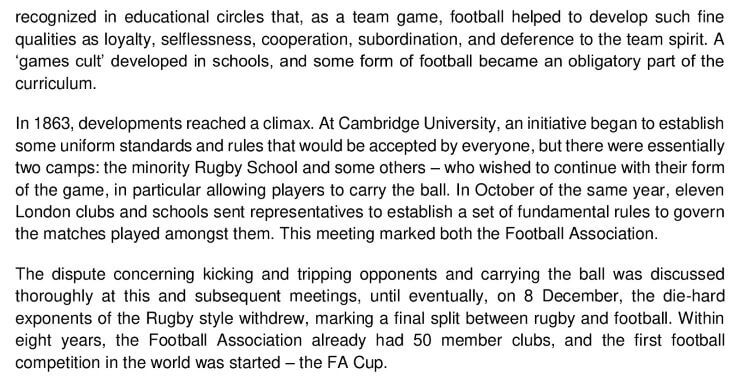The Beginning of Football – IELTS Reading Answers
6 min read
Updated On
-
Copy link
Table of Contents

Limited-Time Offer : Access a FREE 10-Day IELTS Study Plan!
Reading Passage
The Beginning of Football


Questions 1-7
Reading Passage has ten paragraphs A-J.
List of Headings
- Limited success in suppressing the game
- Opposition to the role of football in schools
iii. A way of developing moral values
- Football matches between countries
- A game that has survived
- Separation into two sports
vii. Proposals for minor improvements
viii. Attempts to standardize the game
- Probably not an early version of football
- A chaotic activity with virtually no rules
Choose the correct headings for paragraphs D-J from the list of headings below.
Write the correct number i-x in boxes 1-7 on your answer sheet.
1 Paragraph D
2 Paragraph E
3 Paragraph F
4 Paragraph G
5 Paragraph H
6 Paragraph I
7 Paragraph J
Questions 8-13
Complete each sentence with the correct ending A-l from the box below.
Write the correct letter A-F in boxes 8-13 on your answer sheet.
8 Tsu’chu
9 Kemari
10 Harpastum
11 From the 8th to the 19th centuries, football in the British Isles
12 In the past, the authorities legitimately despised the football and acted on the belief that football
13 When it was accepted in academic settings, football
A was seen as something to be encouraged in the young.
B involved individual players having different responsibilities.
C was influenced by a game from another country.
D was a cooperative effort by all the players.
E distracted people from more important activities.
F was played by teams of a fixed size.
G was less popular than it later became.
H was often played by one community against another.
I formed part of a celebration.
Reading Answers
1 Answer: Ⅸ
Question type: Matching the headings
Answer location: Paragraph D, full
Answer explanation: “The Romans had a much livelier game, ‘harpastum’. Each team member had his specific tactical assignment and took a noisy interest in the proceedings and the score. The role of the feet was so small, as scarcely to be of consequence. The game remained popular for 700 or 800 years, but, although it was taken to England, it is doubtful whether it can be considered as a forerunner of contemporary football.” This suggests that the Harpasatum wasn’t a promising antecedent of modern-day football. This is mentioned in paragraph D.
2 Answer: Ⅹ
Question type: Matching the headings
Answer location: Paragraph E, lines 1-3
Answer explanation: “The game that flourished in Britain from the 8th to the 19th centuries was substantially different from all the previously known forms – more disorganized, more violent, more spontaneous, and usually played by an indefinite number of players.” This suggests that the game that developed in Britain from the 8th to the 19th centuries considerably used to be led to chaos and disorganization.
3 Answer: Ⅰ
Question type: Matching the headings
Answer location: Paragraph F, lines 1-5
Answer explanation: “There was tremendous enthusiasm for football, even though the authorities repeatedly intervened to restrict it, as a public nuisance. In the 14th and 15th centuries, England, Scotland, and France all made football punishable by law, because of the disorder that commonly accompanied it, or because the well-loved recreation prevented subjects from practicing more useful military disciplines.” The authorities trying to limit and curb the game suggests that the game was being tried to be suppressed and be limited, however, the efforts were unsuccessful.
4 Answer: Ⅶ
Question type: Matching the headings
Answer location: Paragraph G, lines 4-6
Answer explanation: “Mulcaster claimed that all that was needed was to refine it a little, limit the number of participants in each team, and, more importantly, have a referee to oversee the game.” This is suggestive of the minute proposals aimed at refining the game for better organization and discipline.
5 Answer: Ⅲ
Question type: Matching the headings
Answer location: Paragraph H, lines 4-6
Answer explanation: “It was recognized in educational circles that, as a team game, football helped to develop such fine qualities as loyalty, selflessness, cooperation, subordination, and deference to the team spirit.” Thus, football started being seen as a way to inculcate moral values and brotherhood among the students in the education system.
6 Answer: Ⅷ
Question type: Matching the headings
Answer location: Paragraph I, lines 1-4
Answer explanation: “At Cambridge University, an initiative began to establish some uniform standards and rules that would be accepted by everyone, but there were essentially two camps: the minority Rugby School and some others – wished to continue with their form of the game, in particular allowing players to carry the ball.” This suggests that the attempts were made to streamline and standardize the game for the safety and goodwill of the players.
7 Answer: Ⅵ
Question type: Matching the headings
Answer location: Paragraph J, lines 1-3
Answer explanation: “The dispute concerning kicking and tripping opponents and carrying the ball was discussed thoroughly at this and subsequent meetings, until eventually, on 8 December, the die-hard exponents of the Rugby style withdrew, marking a final split between rugby and football.” This suggests that due to a stark difference in the opinions, the exponents and enthusiasts of Rugby didn’t concede to the rules that were made, which led to the separation of Football and Rugby.
8 Answer: I
Question type: Matching sentence endings
Answer location: Paragraph B, lines 1-3
Answer explanation: “The very earliest form of football for which we have evidence is the ‘tsu’chu’, which was played in China and may date back 3,000 years. It was performed in front of the Emperor during festivities to mark his birthday.” This suggests that the Tsu’chu was played on the day of an event or celebration, such as the king’s birthday. Therefore, the answer is the option I.
9 Answer: D
Question type: Matching sentence endings
Answer location: Paragraph C full
Answer explanation: “Another form of the game, also originating from the Far East, was the Japanese ‘kemari’ which dates from about the fifth century and is still played today. This is a type of circular football game, a more dignified and ceremonious experience requiring certain skills, but not competitive in the way the Chinese game was, nor is there the slightest sign of struggle for possession of the ball. The players had to pass the ball to each other, in a relatively small space, trying not to let it touch the ground.” This suggests that the Kemari game was played by the cooperation and synchronization of the players Therefore, the answer is option D.
10 Answer: B
Question type: Matching sentence endings
Answer location: Paragraph D, lines 1-2
Answer explanation: “The Romans had a much livelier game, ‘harpastum’. Each team member had his specific tactical assignment and took a noisy interest in the proceedings and the score.” This suggests that the Harpastum was very energetic and involved the players who all had different responsibilities. Therefore, the answer is option B.
11 Answer: H
Question type: Matching sentence endings
Answer location: Paragraph E, lines 1-4
Answer explanation: “The game that flourished in Britain from the 8th to the 19th centuries was substantially different from all the previously known forms – more disorganized, more violent, more spontaneous, and usually played by an indefinite number of players. Frequently, the games took the form of a heated contest between whole villages.” This suggests that the game that flourished in Britain from the 8th to the 19th centuries was quite aggressive and intensive. It was so competitive that it used to take the form of a vehement battle between the teams that used to play against each other. Therefore, the answer is option H.
12 Answer: E
Question type: Matching sentence endings
Answer location: Paragraph F, lines 2-5
Answer explanation: “In the 14th and 15th centuries, England, Scotland, and France all made football punishable by law, because of the disorder that commonly accompanied it, or because the well-loved recreation prevented subjects from practising more useful military disciplines.” This suggests that football was banned and prohibited as it used to be considered a distracting activity that took people’s interest off more important activities such as military disciplines. Therefore, the answer is option E.
13 Answer: A
Question type: Matching sentence endings
Answer location: Paragraph H, lines 4-7
Answer explanation: “It was recognized in educational circles that, as a team game, football helped to develop such fine qualities as loyalty, selflessness, cooperation, subordination, and deference to the team spirit. A ‘games cult’ developed in schools, and some form of football became an obligatory part of the curriculum.” This suggests that football became an integral and essential part of the curriculum in the education system. Students were encouraged to play the game. Therefore, the answer is option A.
Check More IELTS Reading Answers
Practice IELTS Reading based on question types

Start Preparing for IELTS: Get Your 10-Day Study Plan Today!
Recent Articles

Nehasri Ravishenbagam

Haniya Yashfeen

Haniya Yashfeen

Haniya Yashfeen




Post your Comments